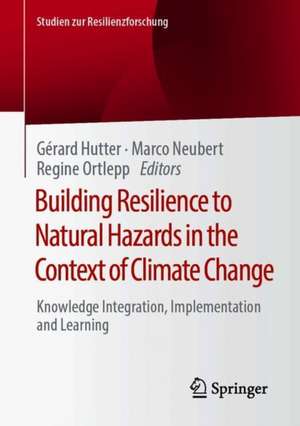Building Resilience to Natural Hazards in the Context of Climate Change: Knowledge Integration, Implementation and Learning: Studien zur Resilienzforschung
Editat de Gérard Hutter, Marco Neubert, Regine Ortleppen Limba Engleză Paperback – 21 iul 2021
Preț: 467.60 lei
Preț vechi: 550.12 lei
-15% Nou
Puncte Express: 701
Preț estimativ în valută:
89.47€ • 93.42$ • 74.05£
89.47€ • 93.42$ • 74.05£
Carte tipărită la comandă
Livrare economică 04-18 aprilie
Preluare comenzi: 021 569.72.76
Specificații
ISBN-13: 9783658337018
ISBN-10: 365833701X
Pagini: 250
Ilustrații: XIV, 250 p. 18 illus., 15 illus. in color.
Dimensiuni: 148 x 210 mm
Greutate: 0.32 kg
Ediția:1st ed. 2021
Editura: Springer Fachmedien Wiesbaden
Colecția Springer
Seria Studien zur Resilienzforschung
Locul publicării:Wiesbaden, Germany
ISBN-10: 365833701X
Pagini: 250
Ilustrații: XIV, 250 p. 18 illus., 15 illus. in color.
Dimensiuni: 148 x 210 mm
Greutate: 0.32 kg
Ediția:1st ed. 2021
Editura: Springer Fachmedien Wiesbaden
Colecția Springer
Seria Studien zur Resilienzforschung
Locul publicării:Wiesbaden, Germany
Cuprins
1. Building resilience to natural hazards in the context of climate change – Introducing the focus and agenda of the edited volume.- 2. Knowledge integration for building resilience – The example of flood risk maps.- 3. Justice and resilience in flood risk management: What are the socio-political implications?.- 4. House lifting to improve flood resilience in settlement are-as – An example of the Elbe village Brockwitz (Saxony).- 5. Sustainability and resilience – A practical approach to assessing sustainability in innovative infrastructure projects.- 6. Building heat-resilient neighborhoods – Testing the implementation on buildings and in open spaces in two sample quarters Dresden and Erfurt.- 7. The Impulse Project Stuttgart – Stimulating resilient urban development through blue-green infrastructure.- 8. Participation for building urban climate resilience? Results from four cities in Germany.- 9. Building resilience in the context of multi-level governance – Insights from a living lab in the Ruhr.- 10. Project-based learning for building urban resilience – Reflecting on project examples of climate change adaptation in the Dresden region.
Notă biografică
Dr. Gerard Hutter: Since 1996 employee, since 2001 project manager at the Leibniz Institute of Ecological Urban and Regional Development (IOER), Dresden; scientific focus: Strategic planning for environmental risk reduction and climate change adaptation, urban resilience, in particular social resilience.
Dr. Marco Neubert: Since 2000 employed at the Leibniz Institute of Ecological Urban and Regional Development (IOER), Dresden, since 2007 project manager; scientific focus: Vulnerability and risk analyses, impact modelling, resilience, climate change impacts, adaptation to climate change, applied geoinformatics (Geographic Information Systems, modelling, remote sensing), landscape ecology and landscape planning.
Dr.-Ing. habil. Regine Ortlepp: Since 2013 employed, since 2017 Head of Research Department at the Leibniz Institute of Ecological Urban and Regional Development (IOER), Dresden; scientific focus: Resource efficiency, circular economy, sustainable construction, adaptation measures to climate change, risk assessment, technical and ecological resilience.
Textul de pe ultima copertă
Urban resilience and building resilience are “hot topics” of research and practice on sustainability in the context of climate change. The edited volume advances the “state of art” of urban resilience research through focusing on three important processes of building resilience: knowledge integration, implementation, and learning. In the volume, knowledge integration primarily refers to the combination of specialized knowledge domains (e.g., flood risk management and urban planning). Implementation refers to realized specific changes of the building stock and related green, blue and grey infrastructures at local level (e.g., for dealing with rising temperatures and heat waves at the neighborhood scale in cities). Learning requires moving beyond single projects and experiments of resilience to enhance sustainability at city and regional scale. The editors adopt an interdisciplinary approach to this volume of the Springer series on resilience. The volume includes contributions from civilengineering, physical geography, the social sciences, and urban planning.
The Editors
Dr. Gerard Hutter: Since 1996 employee, since 2001 project manager at the Leibniz Institute of Ecological Urban and Regional Development (IOER), Dresden; scientific focus: Strategic planning for environmental risk reduction and climate change adaptation, urban resilience, in particular social resilience.
Dr. Marco Neubert: Since 2000 employed at the Leibniz Institute of Ecological Urban and Regional Development (IOER), Dresden, since 2007 project manager; scientific focus: Vulnerability and risk analyses, impact modelling, resilience, climate change impacts, adaptation to climate change, applied geoinformatics (Geographic Information Systems, modelling, remote sensing), landscape ecology and landscape planning.
Dr.-Ing. habil. Regine Ortlepp: Since 2013 employed, since 2017 Head of Research Department at the LeibnizInstitute of Ecological Urban and Regional Development (IOER), Dresden; scientific focus: Resource efficiency, circular economy, sustainable construction, adaptation measures to climate change, risk assessment, technical and ecological resilience.
Caracteristici
Based on an interdisciplinary approach to urban resilience and building resilience Provides specific information on knowledge integration, implementation, and learning Develops insights in and an outlook on innovations for dealing with natural hazards and climate change





